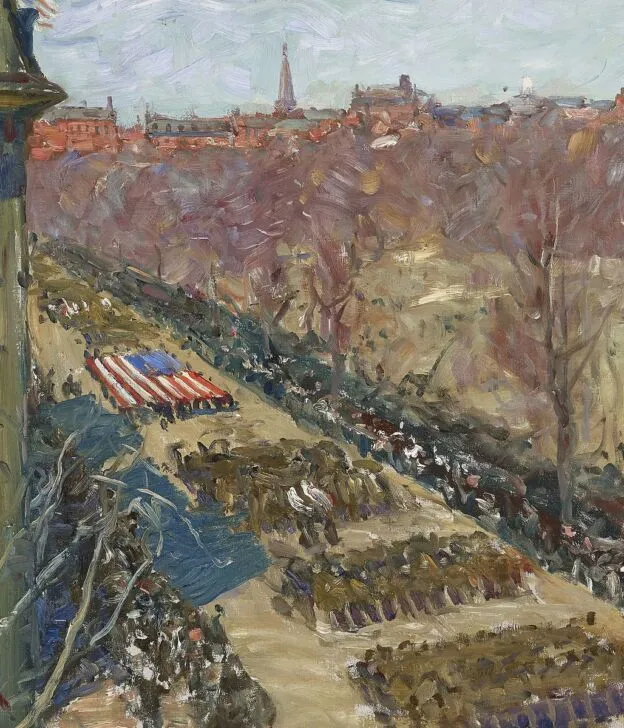
Our civics deficit is a national security crisis
On April 19, 1775 — 250 years ago today — the British Royal Army clashed with colonial militia in Massachusetts. Lexington and Concord marked the first battle of the War for Independence, villages outside Boston ringing with the “ shot heard ‘round the world .” Why did ordinary farmers and shopkeepers rise up against their imperial masters? Because liberty and self-government mattered above all earthly things.
That civic spirit is fading fast from America today. A recent Gallup poll found that only 41% of people would be willing to fight if our country were invaded. From the rise of political extremism to the decline of civic knowledge, we face diminishing appreciation for the meaning and value of our freedom. Gallup recently found alarmingly low patriotism among the 18-29 cohort: Only 18% are “extremely proud” to be American, down from over 40% in 2015. Our founders would have seen this “civics deficit” as existential. How can we defend ourselves from threats abroad if we don’t understand what we love about our home?
This should be a “Sputnik moment” for civic education. After watching the Soviet Union beat us at launching a satellite in space in 1957, America heavily invested in science and technology education, and later put the first person on the moon. We should honor the men who stood for freedom at Lexington and Concord, and redress our failing patriotism and civic understanding by prioritizing civics. The good news is that there are signs of a civics renaissance at both the K-12 and collegiate levels, but we must invest much more in this effort.
One crucial indicator of our poor civic health is persistent extremism, coupled with an apathetic political middle. People inflamed by the internet’s echo chambers and stoked to greater heights by political violence have yielded entrenched divisions between Right and Left. Our enemies understand this problem and seek to exploit it. China, Iran, and Russia have each tried weaponizing disinformation and social media against the public. We need civic resilience and national self-confidence to overcome these threats.
America is exceptional for its pre-partisan political tradition. The great documents forming our democratic republic, from the Declaration of Independence to the Constitution, are not the exclusive inheritance of any party. They belong to us all. They should be, first and foremost, a source of unity against the threat evident from our enemies online and our own political extremists.
A bipartisan national report, ” Educating for American Democracy,” concluded in 2021 that we are failing to transmit that pre-partisan tradition to students. It is no surprise that the 2022 National Assessment of Educational Progress found eighth graders performed as poorly on history and civics tests as any year measured since the 1990s. For decades, we have under-supported civics classrooms at all levels, with the result that people feel less patriotic than ever before. Why would citizens be grateful for what they don’t understand?
For decades, we have under-supported civics classrooms at all levels, with the result that people feel less patriotic than ever before. Why would citizens be grateful for what they don’t understand?
And yet, there are signs of a civic renaissance. A recent Jack Miller Center poll found that 89% of parents believe civic education is vital and want students to undertake more studies of our nation’s principles and history. State legislators across America are hearing these calls and investing in more civics courses for K-12 students.
A renewed focus on the study of civic thought is dawning in higher education. Eight state governments, including Arizona, Texas, Florida, and Ohio, have established schools and programs at their flagship universities to teach America’s political tradition as part of a liberal education. Private universities, such as Stanford and Johns Hopkins, have new civics requirements. A cross-ideological Alliance for Civics in the Academy is launching.
The approaching 250th anniversary of American independence offers huge opportunities for engaging a broader public. By commemorating great events such as Lexington and Concord, we can understand the enduring value of the principles of liberty, equality, and constitutional government that our forefathers defended. The anniversaries leading up to the Declaration and the creation of our constitutional republic offer families, community associations, and civic institutions important occasions to discuss freedom and the sacrifices needed to preserve it.
In 1838, Abraham Lincoln warned that the passing of the Revolutionary generation posed an immense problem for perpetuating our polity. With the fading of the original patriotism of ’76, a rising spirit of political extremism regarding slavery and other moral issues was yielding violence, what we now call polarization. The young lawyer argued, two decades before a civil war, that America must prioritize “general intelligence, sound morality, and in particular, a reverence for the constitution and laws” — that is, civic education.
Today, we face both a wily foreign threat and our own dangerous ignorance. We must arm ourselves with civic knowledge and civic virtues, including a reflective patriotism, civic friendship across partisan differences, and civil disagreement. We must heed Lincoln’s prescient warning that if we fail to cure the ignorance fueling civic disintegration, the American experiment might perish — not by a foreign conqueror but “by suicide.”
Paul Carrese, a professor at Arizona State University and senior fellow of the Jack Miller Center for Teaching America’s Founding Principles and History, was the founding director of ASU’s School of Civic and Economic Thought and Leadership.
